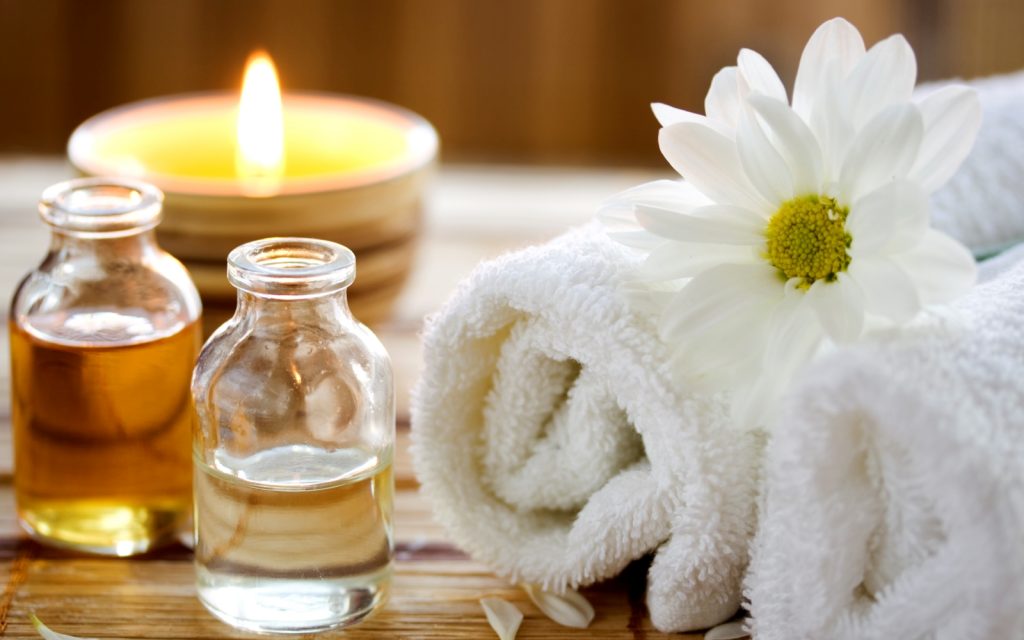Aromatherapy benefits have been studied in connection with improving both short-term health problems, along with more serious disorders. Research shows that anyone with the following health conditions can likely benefit from aromatherapy:
- Chronic stress or anxiety
- Depression
- Insomnia and trouble sleeping
- Muscle pain
- Joint pain
- Respiratory infections
- Digestive upset
- PMS or menopause symptoms
- Skin problems or disorders, including bites, rashes, bruising, cellulite or acne
- Blood sugar fluctuations
- Cancer
- Fatigue
Aromatherapy Oils Have both Sedative and Stimulant Effects
A growing pool of both human and animal studies has shown that aromatherapy oils can have both sedative and stimulant effects, plus positive effects on the immune system and central nervous system. Recently, studies have shown that fragrant aromatherapy oils have positive effects on the region in the brain called the limbic system. The limbic system helps control both emotional responses and behaviors.
Understand that the key to achieving results from aromatherapy is to use pure, therapeutic-grade oils. The effectiveness of aromatherapy practices always depends on the quality of the oils used, plus the dosage.
Proven Benefits of Aromatherapy
1. Promotes Relaxation
Many studies have shown that certain essential oils used in aromatherapy practices, including lavender and chamomile, can help people who feel stressed or anxious to relax . Lavender has a universal calming effect. It lowers activation of the sympathetic nervous system, responsible for the fight or flight response and physical symptoms, such as sweaty palms or a racing heart.
Results from one study published in the Journal of Advanced Nursing found that patients who received aromatherapy reported significantly greater improvement in their mood and perceived levels of anxiety and felt less anxious and more positive immediately following the therapy.
If you’re new to aromatherapy, a simple way to begin is adding several drops of relaxing essential oils for anxiety to a warm bath. For example, five to seven drops of lavender added to a soaking bath (sometimes also with Epsom salt) is a common way to help manage daily stress.
2. Sleep Quality
Because many aromatherapy oils help people unwind and feel less stressed, they can be very useful for making you feel sleepier before bedtime. Those with insomnia, anxiety, or even restless leg syndrome and hot flashes that strike during the night can benefit from sleep-inducing essential oils, including lavender oil, chamomile, rose, vetiver, and ylang ylang.
An hour or so prior to going to sleep, try diffusing essential oils in your bedroom using either an aromatherapy candle, electronic diffuser or oil burner. Diffusing aromatherapy oils work by releasing very tiny particles into the air. These particles are directly inhaled through the nostrils, where they travel to the brain and are able to cross the blood-brain barrier. Adding about five to 10 drops to a diffuser in your home or office can help create a calm environment. Plus make a room smell great.
3. Treats Respiratory Issues
Certain aromatherapy oils have antiseptic properties that help cleanse the air of bacteria, fungus, and mold that can contribute to respiratory problems, such as congestion, coughing or sneezing.
Research shows that using citrus oils in aromatherapy practices can help improve overall immune function. It can also reduce fatigue associated with depressive states. Aromatic oils, such as orange and lemon (those with a citrus fragrance), can restore stress-induced immunosuppression. They can also help restore homeostatic balance. Essential oils for depression and citrus oils are also beneficial for improving mental health. They do this by stimulation of the sensory system called the “olfactory system,” which controls one’s sense of smell.
Depressive patients showed normalized neuroendocrine hormone levels when given citrus oils. They had improved immune function that was comparable to the effects of antidepressants.
Other than diffusing oils in your home, you can inhale aromatic oils directly from the bottle or rub some directly onto your chest or neck so you can breathe in the particles. There are some great essential oils for allergies and essential oils for sore throat and other respiratory problems. Essential oils can help you overcome:
- sinus infections
- allergies
- colds
- the flu or coughs
- and fatigue.
Some of these oils include eucalyptus, peppermint, frankincense, rosemary, myrrh, lemon, oregano, and tea tree.

4. Skin Health
Diluted essential oils can be spritzed onto the skin or scalp. This will help to reduce acne, dandruff, cellulite, toe fungus, itching, inflammation from bites, rashes or to improve wound healing. Tea tree oil (Melaleuca alternifolia) is one of the most popular oils for treating skin problems. It has antibacterial, antiseptic, antifungal and other cleansing qualities.
To point out, other aromatherapy oils for skin (including essential oils for acne) include lavender, clary sage, juniper berry, lemon, orange, helichrysum, and frankincense. To make a homemade aromatherapy oil spritzer that you can spray into the troubled area of your skin, add 10–20 drops of oil to a spray bottle containing about four ounces of water.
Use several sprays at one time on your skin, and keep what you don’t use right away for later use. You can also use the same oils on your skin or scalp directly (including making a homemade essential oil shampoo) or spray them throughout your home for other benefits.
5. Manage Symptoms or Side Effects of Cancer
Aromatherapy is primarily used as supportive care during treatment by cancer patients while also used for stress reduction, pain management, or simply for general well-being. It’s common for people battling cancer to try different methods of complementary treatments, including massage therapy, meditation or acupuncture, and aromatherapy oils.
Various aromatherapy oils are capable of lowering symptoms associated with cancer or hospice care, such as nausea, fatigue, aches or pains, depression, and insomnia. Essential oils that can help you cope with cancer symptoms or side effects caused by cancer treatments include frankincense, ginger, lavender, geranium, rose, neroli, and clary sage.
For instance, one study published in the American Journal of Hospice and Palliative Care found that aromatherapy helped hospice patients decrease pain, anxiety and depression, and promote an increased sense of well-being. The study measured the responses of 17 cancer hospice patients to humidified lavender essential oil used in 60-minute aromatherapy sessions. Following aromatherapy sessions, results reflected a positive change in blood pressure and pulse, along with reduced symptoms of pain and emotional upset.
6. Soothes Pain and Inflammation
A combination of different aromatherapy oils can be inhaled or applied to the troubled area to help soothe tight or tense muscles, achy joints, inflamed tissue injuries, or pain from headaches. Popular essential oils for arthritis pain include ginger, myrrh, turmeric, and orange. You can use other aromatherapy oils for nearly any source of pain, including essential oils for headaches, such as peppermint, spearmint, rosemary, and frankincense.
7. Reduce Fatigue and Raise Alertness
An International Journal of Neuroscience study involving 40 patients experiencing depressed moods and mental fatigue found that aromatherapy positively affects alertness, competency on testing (in this case regarding math problems) and improves overall mood. Forty adults were given three minutes of aromatherapy using one of two aromas, lavender (considered a relaxing odor) or rosemary (considered a stimulating odor). Participants completed math computations and surveys regarding their mood before and after the therapy.
Also note that those exposed to lavender aromatherapy showed increased beta power, suggesting increased drowsiness. They also reported decreases in depressed moods and feeling more relaxed. Although they reported feeling more drowsy, the lavender group participants actually performed the math computations faster and more accurately following aromatherapy. The rosemary group showed decreased frontal alpha and beta power, suggesting increased alertness. They also had lower state anxiety scores, reported feeling more relaxed and alert, and were faster at completing the math problems.
8. Libido improves
Aromatherapy has a long history of use for improving libido, raising energy through increased blood flow and treating sexual dysfunctions. Popular aromatherapy oils for improving hormonal balance, “feminine power” and sexual health include:
- clary sage
- sandalwood
- rosemary
- geranium
- ylang ylgang
- and neroli.
9. Improves Digestion and Lowers Nausea
Aromatherapy oils, such as ginger, turmeric, grapefruit, peppermint, lemon, chamomile, and eucalyptus, can help curb:
- acid reflex,
- ulcers,
- nausea,
- indigestion,
- morning sickness or
- stomach aches due to PMS.
A 2015 study published in the Journal of Basic Physiology and Pharmacology found that turmeric and ginger essential oils have strong gastro-protective activities, including anti-ulcer potential. Both supply high levels of antioxidant enzymes. These oils have been shown to reduce necrosis, erosion, and hemorrhage of the stomach wall, significantly reducing stomach pains.
In conclusion, aromatherapy is a wonderful way to improve your life in so many ways. Find a local aromatherapist and learn how this type of therapy can make some wonderful changes for you today. To learn more go here to another one of my aromatherapy pages.
Another Tool for a Better Life
We have the most incredible bio-hacking health solution for you today! This is a 1-2 punch that will knock it out of the park. You won’t find this perfect solution to get your body in the best condition anywhere else. New science – bio-hacking – is having amazing results for so many people. We have found the solution, and it is available here!
Follow me on: Instagram – @offers26 and Twitter – @msazkat

